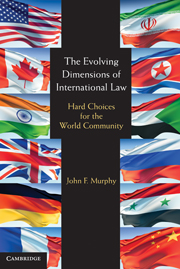Book contents
- Frontmatter
- Contents
- Acknowledgments
- Introduction
- 1 The Multifaceted Nature of International Law
- 2 International Institutions
- 3 Who Shall Enforce the Peace?
- 4 The Law of Armed Conflict
- 5 Arms Control, Disarmament, Nonproliferation, and Safeguards
- 6 Human Rights
- 7 International Environmental Issues
- 8 Causes of the Present Malaise, Concluding Observations, and a Prognosis
- Index
- References
3 - Who Shall Enforce the Peace?
Published online by Cambridge University Press: 05 June 2012
- Frontmatter
- Contents
- Acknowledgments
- Introduction
- 1 The Multifaceted Nature of International Law
- 2 International Institutions
- 3 Who Shall Enforce the Peace?
- 4 The Law of Armed Conflict
- 5 Arms Control, Disarmament, Nonproliferation, and Safeguards
- 6 Human Rights
- 7 International Environmental Issues
- 8 Causes of the Present Malaise, Concluding Observations, and a Prognosis
- Index
- References
Summary
As is well known, the primary motivation of the founders of the United Nations was to create an international institution that would be more effective than the League of Nations was in maintaining international peace and security. Under the U.N. Charter the Security Council is given the “primary responsibility for the maintenance of international peace and security,” and it was the vision of the founders of the United Nations that the permanent members of the Security Council, especially the United States and the Soviet Union, would continue the cooperation that characterized their actions during World War II and be the backbone for the efforts of the new institution to prevent and, if necessary, to suppress by armed force aggression and other threats to and breaches of the peace.
With rare exceptions the vision of the founders has not been realized. To be sure, the record is not one of consistent failure. From time to time various permanent members have played key roles in efforts to meet aggression or threats to the peace. But the record on the whole is scandalously bad. Surprisingly, with the exception of the Gulf War in 1991, the record has been especially poor since the end of the Cold War.
In a speech to the United Nations General Assembly in September 2003, Kofi Annan, then Secretary-General of the United Nations, suggested that “a decisive moment” had arrived for the United Nations and “in particular for the aspiration set out in the [U.N.] Charter to provide collective security for all.”
- Type
- Chapter
- Information
- The Evolving Dimensions of International LawHard Choices for the World Community, pp. 103 - 160Publisher: Cambridge University PressPrint publication year: 2010



